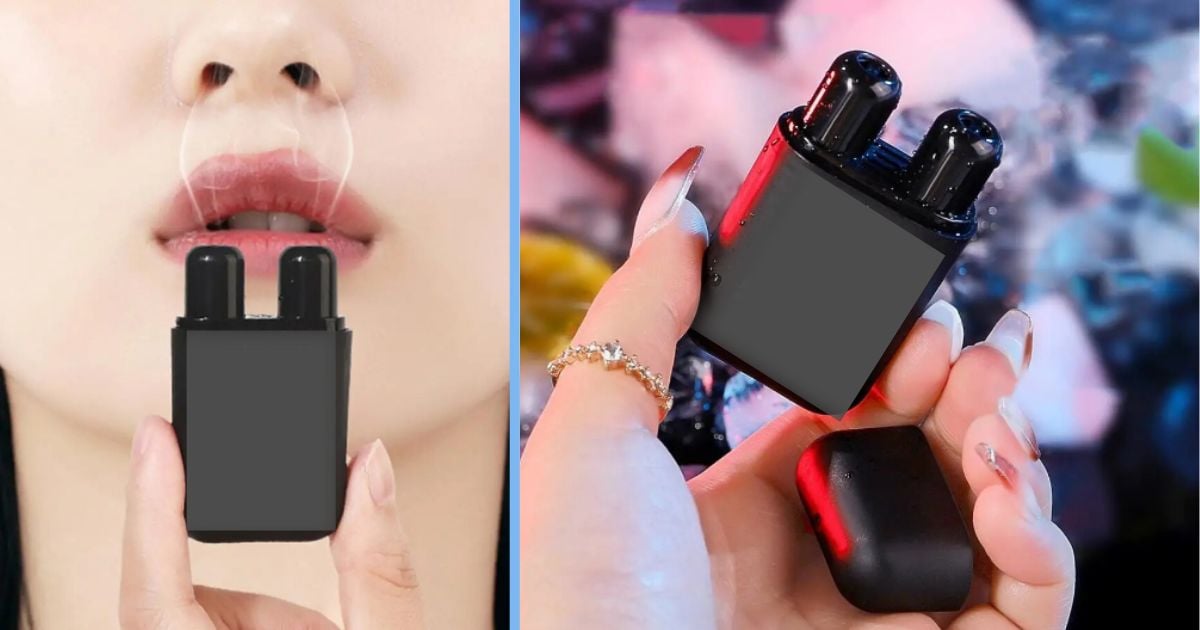They may appear harmless, no bigger than your average matchbox or AirPod cases, but these products may be causing your body harm unknowingly.
The Ministry of Health (MOH) and Health Science Authority (HSA) are “closely monitoring” the use of what is known as “energy stick” inhalers, as there are concerns that young people may get addicted to them.
In a statement to Parliament on 4 March 2024, Senior Minister of State for Health Janil Puthucheary stated that an increasing number of youth in Singapore are getting their hands on these nasal inhalers primarily due to social media marketing tactics.
This came after concerns were raised by fellow members of Parliament about the potential harm of these products amongst children and students.
What are “Energy Stick” Nasal Inhalers?
“Energy stick” nasal inhalers are advertised to give users an energy boost, and contain ingredients that are similar to the conventional nasal decongestant inhalers.
Other than energy boosts, these nasal inhalers also claim to also be able to clear nasal congestion, help with reducing anxiety and even improve sleep quality.
They also come in many flavours, such as mango, grape, watermelon and mojito (yes, mojito, for school children). The pocket-sized product resembles an inconspicuous wireless earphone case with two prongs that contain porous strips soaked in liquid.
These flavour additives are added to the inhalers and are marketed as “healthier” and “more natural”, but there are limited studies to back these claims, said Dr Sewa Duu Wen, head and senior consultant of respiratory and critical care medicine at Singapore General Hospital.
“In fact, there is broad literature suggesting some of these flavouring compounds contribute to airway toxicity, impaired respiratory immune cell function and cause cellular damage,” he noted.
While not addictive, their presence in cigarettes and vapes may lead to increased adolescent usage and uncertain health risks. According to health experts, individuals using “energy stick” inhalers may escalate to smoking or vaping, posing risks of respiratory issues and long-term health harm.
According to The Straits Times, these inhalers could be bought on e-commerce websites like Shopee and Lazada for as low as S$1.60 each. The listings also claimed that the energy sticks contained “essential oils”, “natural ingredients” and “safe, plant-based extracts”.
One listing even had more than 4,200 buyers and has an average rating of 4.8 out of 5. It only took a two-week wait to fall into the hands of a buyer.
Said Dr Sewa, “Some of these products found online are produced by companies with unclear quality control standards and may not be subjected to the same rigorous regulations placed in more established companies.”
Dr Sewa stated that ingredients like menthol, Borneo camphor, and food flavouring in the inhaler are found in FDA-approved health products for nasal congestion.
Yet, there is no clear evidence found that supports the claims of health benefits like improving sleep quality or reducing fatigue.
Should Energy Sticks be Banned in Singapore?
During the Parliament session on 4 March, concerns were raised by MP for Yio Chu Kang Mr Yip Hon Weng on whether energy sticks should be treated similarly to vaporisers and e-cigarettes, both very much illegal in Singapore.
MP for Chua Chu Kang Mr Zhulkarnain Abdul Rahim also inquired if the Ministry will be raising awareness of the dangers of these inhalers as “gateway devices for potential drug abuse”.
To which, Senior Minister Janil Puthucheary answered that both the MOH and the HSA are closely monitoring their use, paying extra attention to its marketing on social media towards the young.
He added, “We will continue to evaluate these products to ensure they are not adulterated with harmful ingredients such as nicotine as they evolve, and will take the necessary actions to protect public health”.
With these energy sticks so easily accessible to the youth, Dr Sewa stresses that in children, large quantities of these ingredients may lead to more noticeable side effects than in adults.
“Hence, it is advisable to avoid using these products in very young children less than six years old,” he concluded.
The “energy stick” inhaler phenomenon is not isolated to just Singapore, however, as similar trends are reported amongst schoolchildren in Malaysia and China.
Across the Causeway, Malaysia’s health ministry is taking appropriate enforcement action, including any advertisements for the sale of the nasal inhalers.
Some health experts in Malaysia have expressed concerns that energy inhalers may contain harmful substances like lead, mercury, menthol, and nicotine, posing risks to the respiratory system and lungs.
In February 2024, Malaysian Pharmacists Society president Amrahi Buang said that the substances found in the nasal inhalers, including food flavouring and glycerin, go directly into the respiratory system, and the use of it could develop smoking or vaping habits amongst children and teenagers.
“The only difference is that (the energy stick) does not involve combustion,” he added.
Mr Amrahi said nasal congestion inhalers sold at pharmacies for medicinal purposes are registered with the National Pharmaceutical Regulatory Agency, while energy sticks are not.
Mr Amrahi also urged e-commerce platforms to promptly take down any advertisements of the products, calling on them to be responsible and to self-police.
Over in China, the energy sticks are marketed to young children as a means to stay awake in class. They are also marketed as an alertness aid for long-distance drivers.
A customer service advisor for an online shop said that while most of their consumers are secondary school students, some primary school students also use them, possibly “out of curiosity”.
A young consumer in central Henan province said that there is an increased number of classmates using the inhaler, with one saying that he would not feel well if he had not taken a sniff.
The Hubei Provincial Narcotics Control Office warned on social media that inhaling substances through the nose could pose danger to impressionable children.
“Getting used to snorting things could be the starting point for drug use in the future,” a spokesperson for the authority said.
